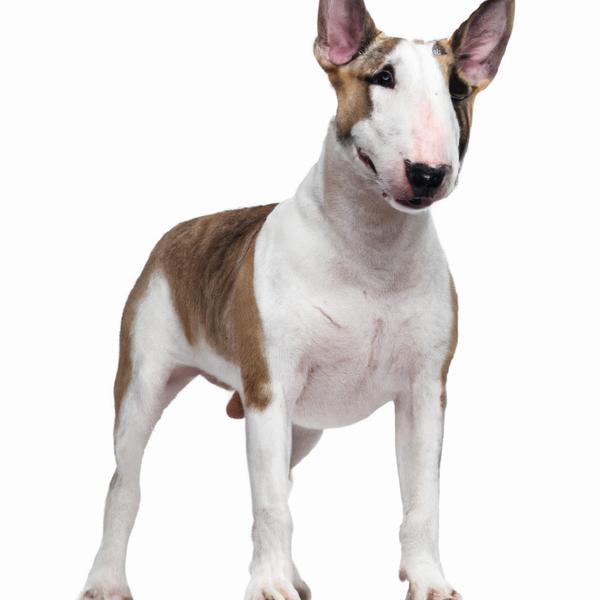Bull Terrier vs. Doberman Shepherd: Breed Differences and Similarities
Hypoallergenic
Are Bull Terriers or Doberman Shepherds hypoallergenic, or neither?
Unfortunately, neither Bull Terrier nor Doberman Shepherd are hypoallergenic, which may not make them the best choice for dog lovers who suffer from pet allergies.
Temperament
What are the personalities of Bull Terrier and Doberman Shepherd dogs?
Active
Protective
Trainable
Keen
Sweet
Tempered
Curious
Energetic
Alert
Courageous
Intelligent
Confident
Obedient
Loyal
Fearless
Watchful
Shedding Level
Do Bull Terriers shed more than Doberman Shepherds, or which breed sheds more, Bull Terriers or Doberman Shepherds?
Bull Terriers are moderate shedders, but regular brushing can reduce shedding and maintain coat health.
Doberman Shepherds are heavy shedders, but regular brushing can help manage shedding and promote a healthy coat.
Watchdog Ability
Which dog breed makes a better watchdog, the Bull Terrier or Doberman Shepherd?
The Bull Terrier and Doberman Shepherd dogs are some of the best choices if you want good watchdogs. These breeds will keep watch over you and your family at all times. They take this task seriously and will typically perform their guarding duty with little to no training. These dogs will require obedience training, or you can consider guard dog training to sharpen their skills.
Ancestry
What are the origins of Bull Terrier and Doberman Shepherd breeds?
Bulldog, Old English Terrier
German Shepherd, Doberman Pinscher
Breed recognition
Which kennel clubs recognize/register Bull Terrier and Doberman Shepherd?
American Canine Registry
American Kennel Club
America's Pet Registry
Canadian Kennel Club
Dog Registry of America Inc.
Federation Cynologique Internationale
Kennel Club of Great Britain
North American Purebred Registry, Inc.
American Canine Association, Inc.
Australian National Kennel Council
Continental Kennel Club
National Kennel Club
New Zealand Kennel Club
United Kennel Club
DRA = Dog Registry of America, Inc.
Date of Birth
When were Bull Terrier and Doberman Shepherd breeds first developed?
1800s
Unknown
Eye Color Possibilites
What are the eye colors of Bull Terrier and Doberman Shepherd dogs?
Brown
Brown
Nose Color Possibilites
What are the natural nose colors of Bull Terrier and Doberman Shepherd?
Black
Black
Coat Color Possibilites
What are the natural colors of the coat for Bull Terrier and Doberman Shepherd breeds?
Fawn
White
Pied
Brindle
Red
Brown
Black
Coat Length
What is the typical coat length for Bull Terrier and Doberman Shepherd breeds?
Bull Terriers have short coats.
Doberman Shepherds have medium-length coats.
Coat Density
What is the density of the coat of Bull Terrier and Doberman Shepherd?
Coat Texture
What is the hair texture of Bull Terrier and Doberman Shepherd?
Straight
Litter Size
What is the usual litter size for Bull Terrier and Doberman Shepherd?
A Bull Terrier can have a litter of 10-12 puppies on average. However, it's worth noting that the size of the litters can vary greatly. Factors that can influence litter size include the health of the mother, breeding history, and genetics.
A Doberman Shepherd can have a litter of 6-10 puppies on average. However, it's worth noting that the size of the litters can vary greatly. Factors that can influence litter size include the health of the mother, breeding history, and genetics.
Adaptability
Bull Terriers are known for their adaptability and can adjust well to different environments and lifestyle changes.
Doberman Shepherds are highly adaptable and versatile, making them excellent companions for families and individuals of all lifestyles.
Health Issues
Between Bull Terrier and Doberman Shepherd, which breed is more prone to health problems?
The Bull Terrier breed is generally very healthy, requiring minimal vet visits. Still, it's important to keep an eye on their health and seek veterinary care when needed.
Doberman Shepherds typically have low vet costs due to their good health, but it's important to monitor their health and seek vet care when necessary.
Major Concerns
What are the major health concerns for Bull Terrier and Doberman Shepherd breeds?
Deafness (Whites)
Kidney Problems
Mitral Valve Disease
Lethal Acrodermatitis
Elbow Dysplasia
Cardiomyopathy
Hip Dysplasia
CVI (Wobbler’s Syndrome)
Minor Concerns
What minor health issues should be kept in mind when owning Bull Terrier and Doberman Shepherd?
Entropion
Ectropion
Demodectic Mange
Eye Disease
Laryngeal Paralysis
Gastric Torsion
Osteosarcoma
Cataracts
Hip Dysplasia
Pannus
Progressive Posterior Paresis
Perianal Fistulas
vonWillebrand’s Disease
Dermatitis
Occasional Tests
What occasional tests are recommended for Bull Terrier and Doberman Shepherd breeds?
Cardiac
Eye
Blood Test
Hearing (Whites)
Up:Uc Ratio For Kidney Function
Skin Scraping
Cardiac
X-Rays
Physical Examination
Eye Examinations
DNA Test
Hip
Energy
How do the energy levels of Bull Terriers and Doberman Shepherds compare?
Bull Terriers' high energy levels make them unsuitable for a low-key dog, choose accordingly.
Doberman Shepherds are suitable for those with a balanced lifestyle as they have an average energy level.
Social Needs
Bull Terrier vs Doberman Shepherd social needs comparison
Bull Terrier has very high social needs and requires regular mental and physical stimulation, a job or purpose, and companionship.
Doberman Shepherd has average social needs and is less independent than other breeds.
Exercise Needed
Bull Terrier vs Doberman Shepherd exercise need comparison.
The Bull Terrier and Doberman Shepherd breeds need significant physical activity to maintain a healthy lifestyle. They are well-suited for those who lead an active lifestyle and enjoy activities such as running, hiking, or other outdoor pursuits.
Sleeping Need
Which of the two sleeps the most/least: Bull Terrier or Doberman Shepherd?
Bull Terrier and Doberman Shepherd dogs tend to sleep less than some other breeds, but it's still important for them to get adequate sleep in order to maintain good health.
Tendency to Bark
Do Bull Terriers or Doberman Shepherds bark more/less frequently?
Bull Terrier dogs are generally less vocal than other breeds and only bark when necessary, such as to alert their owner or communicate.
Doberman Shepherds bark moderately when necessary and may also bark due to certain triggers like fear, alarm, boredom, greeting, separation anxiety and compulsive barking.
Mouthiness
Mouthiness Comparison: Bull Terrier vs Doberman Shepherd?
Roaming urge
Bull Terrier vs Labrador: Running away tendency?
Prey Drive
Bull Terrier or Doberman Shepherd - which breed has a higher level of prey drive?
Past times
What are some enjoyable activities and ways to keep Bull Terrier and Doberman Shepherd entertained?
Walking, Tug of war, Fetching, Playing around, Chewing, Running, Jumping, Walk, Sniffing, Fetch, Catch treats, Play, Chase, Eating Snacks, Hiking, Sleep, Camping, Tug-of-war, Beach, Cuddling
Swimming, Fetch, Tag, Run, Bicycling, Walk, Play, Yoga, Hike, Training, Brushing, Beach, Dog Parks, Car rides, Chase, Walks, Hide & Seek, Walking, Bike ride, Hiking, Guard dog, Catch treats, Tug-of-war, Nap, Off-leash, Water, Road trip, Jog, Frisbee
Activity Level
Which breed has higher energy, Bull Terriers or Doberman Shepherds?
Bull Terrier and Doberman Shepherd are high-energy dogs that require a lot of mental and physical exercise. Without proper stimulation and attention, these breeds can become problematic. If you're considering these breeds, be prepared to invest time and effort in their exercise and training.
Tolerance of being left alone
Walks per Week
How many miles should Bull Terrier or Doberman Shepherd walk each week?
There's really no limit to how far you walk your dog as long as they're comfortable. For Bull Terrier, it's at least 8 miles / week. Just remember to build distance and stamina gradually over time.
There's really no limit to how far you walk your dog as long as they're comfortable. For Doberman Shepherd, it's at least 12 miles / week. Just remember to build distance and stamina gradually over time.
Activity per Day
Do Bull Terriers or Doberman Shepherds require more exercise?
In general most Bull Terriers usually need at least 60 minutes of exercise daily. This can be spread across the day and include all sorts of high-energy activities, like walking, running and playing.
In general most Doberman Shepherds usually need at least 90 minutes of exercise daily. This can be spread across the day and include all sorts of high-energy activities, like walking, running and playing.
Grooming
Which breed is easier to maintain in terms of grooming, Bull Terriers or Doberman Shepherds?
The Bull Terrier is a low-maintenance breed that doesn't require much grooming.
The Doberman Shepherd requires an average amount of grooming compared to other breeds.
Brushing Frequency
What is the recommended brushing frequency for Bull Terrier and Doberman Shepherd dogs?
Bull Terrier and Doberman Shepherd should be brushed at least once a week. Of course, you can give them more frequent brushes if you find that they are still shedding a lot.
Brushing Tools
What brushing tools are used for Bull Terriers and Doberman Shepherds?
Pin Brush
Comb
Nail Clipper
Slicker Brush
Comb
Hemostat
Nail Clipper
Cups
How much food should be given to Bull Terrier or Doberman Shepherd in cups?
For an average 60-70 pound (27 - 32 kg) Bull Terrier feed 2.5 cups daily. But, keep in mind, the amount you feed is going to be dependent on the quality of the food you are feeding.
For an average 90-110 pound (41 - 50 kg) Doberman Shepherd feed 4 cups daily. But, keep in mind, the amount you feed is going to be dependent on the quality of the food you are feeding.
Daily Cost
Which breed has a higher daily cost, Bull Terrier or Doberman Shepherd?
The average cost of a Bull Terrier is somewhere $2.10 - $2.70 per day.
The average cost of a Doberman Shepherd is somewhere $3.90 - $4.20 per day.
Monthly Cost
Which breed has a higher monthly cost, Bull Terrier or Doberman Shepherd?
The average per month expenses of a Bull Terrier is between $55 - $73. This makes an average of $660 - $876 per year. It will be on the higher side when the dog is still small because it will need more frequent visits to the vet, shots.
The average per month expenses of a Doberman Shepherd is between $112 - $126. This makes an average of $1344 - $1512 per year. It will be on the higher side when the dog is still small because it will need more frequent visits to the vet, shots.
Intelligence
Comparing Intelligence: Bull Terriers vs Doberman Shepherds
Bull Terrier is a very intelligent and trainable breed.
Doberman Shepherd is highly intelligent and very trainable.
Sensitivity Level
How do Bull Terrier and Doberman Shepherd compare in sensitivity?
These dog breeds are particularly attuned to its environment and the emotions of those around it. Bull Terrier and Doberman Shepherd can be easily overwhelmed by loud noises, new environments, unfamiliar people, or animals. This dog breed is best suited for individuals or families who are patient, gentle, and understanding of its sensitive nature. It may also benefit from a calm and stable home environment, with a consistent routine and plenty of positive reinforcement training.
Affection Dependance
Which is the more affectionate dog breed: Bull Terrier vs Doberman Shepherd?
Apartment Friendly
Which breed is more apartment-friendly: Bull Terrier or Doberman Shepherd?
Bull Terrier and Doberman Shepherd are apartment-friendly dog breeds. They can do perfectly well in apartments providing they are sufficiently exercised and taken out and about as part of their owner's daily lifestyle.
Child Friendly
Do Bull Terriers or Doberman Shepherds have a friendlier temperament towards children?
Bull Terrier and Doberman Shepherd are kid-friendly dogs. They are good with children and excellent dogs with children if they are socialized and trained at a young age.
Senior-friendly
Which dog is more suitable as a pet for the elderly - Bull Terrier or Doberman Shepherd?
Cat Friendly
Do Bull Terrier or Doberman Shepherd breeds have a better compatibility with cats?
Bull Terriers are somewhat cat friendly and can be trained to get along with cats.
Doberman Shepherds are average in their friendliness toward cats and tend to do well with them, especially if raised together.
Dog Friendly
Which breed is more sociable with other dogs: Bull Terrier or Doberman Shepherd?
Bull Terriers and Doberman Shepherds are below average dog friendly dogs. Bull Terriers and Doberman Shepherds may not always get along well with other dogs they have not been raised with.
Pet friendly
How do Bull Terrier or Doberman Shepherd dogs interact with other pets?
Stranger Friendly
Which breed is more friendly with strangers: Bull Terrier or Doberman Shepherd?
Bull Terriers are friendly but may bark at strangers, and training is easy due to their intelligence.
Doberman Shepherds are averagely friendly around strangers but benefit from early socialisation.
Playfulness
Which breed is more playful between Bull Terrier and Doberman Shepherd?
Bull Terriers are very playful, so adopting an older one might be a better option for a more relaxed experience.
Doberman Shepherds have an average level of playfulness, enjoying playtime like most dogs but not excessively so.
Trainability
How do the trainability levels of Bull Terriers and Doberman Shepherds compare?
Bull Terrier and Doberman Shepherd dogs are known for their ease of training and ability to learn quickly, making them a popular choice for pet owners and trainers alike.
Compare Bull Terrier with other breeds

King Charles Yorkie
Bull Terrier vs King Charles Yorkie

Hava-Apso
Bull Terrier vs Hava-Apso
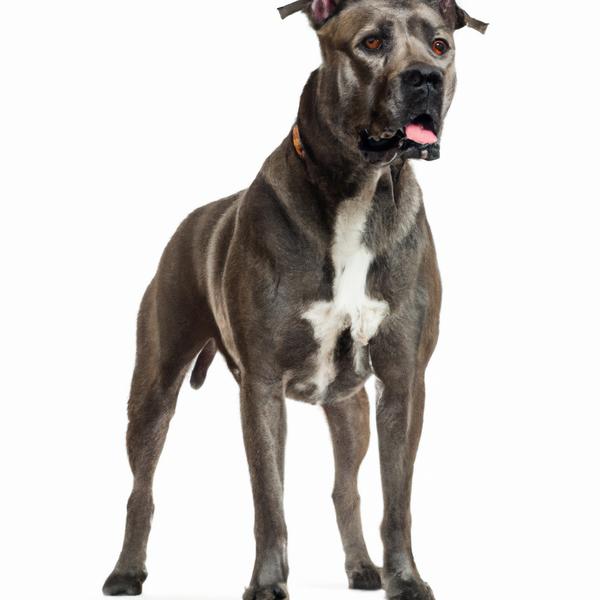
Amstiff
Bull Terrier vs Amstiff
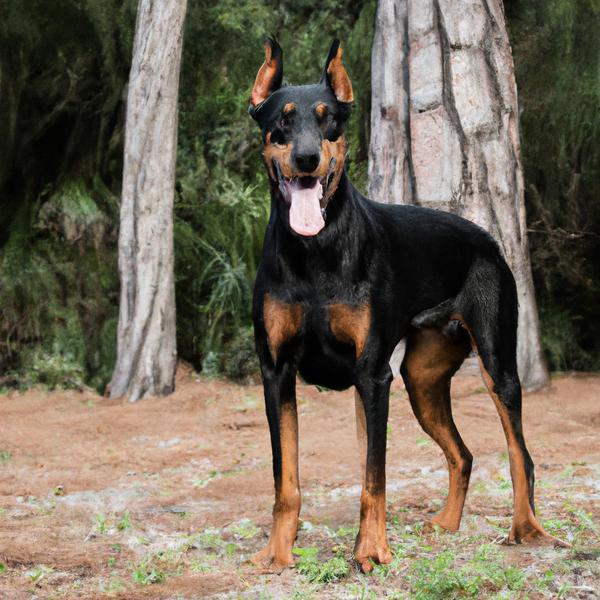
Doberman Shepherd
Bull Terrier vs Doberman Shepherd
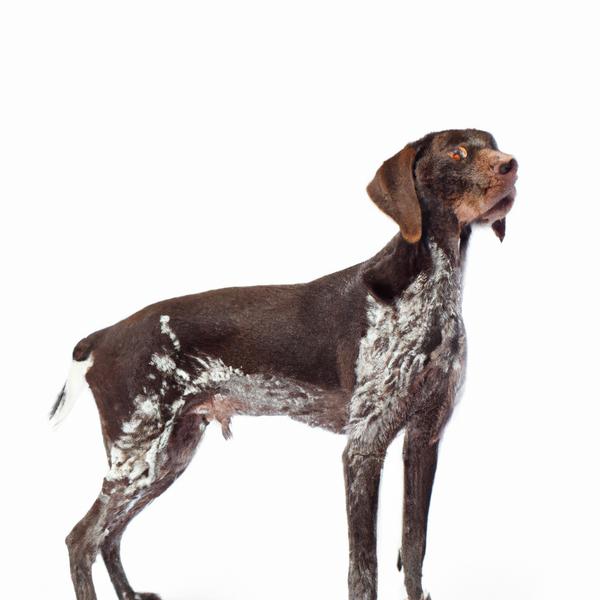
German Shorthaired Sprointer
Bull Terrier vs German Shorthaired Sprointer

English Toy Cocker Spaniel
Bull Terrier vs English Toy Cocker Spaniel
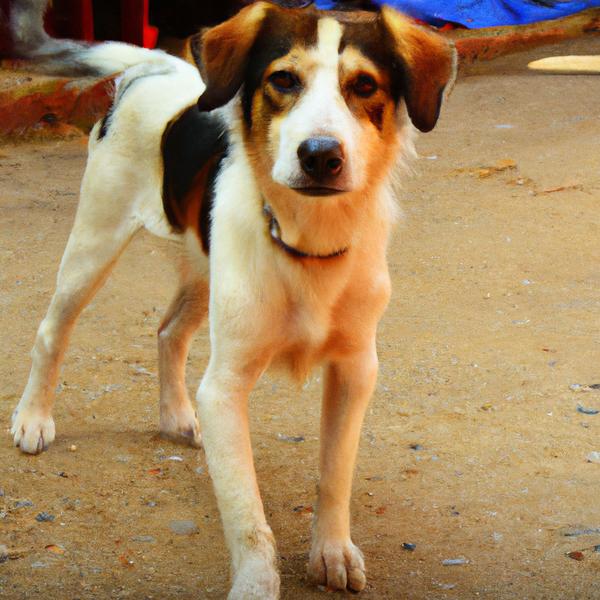
Wheagle
Bull Terrier vs Wheagle
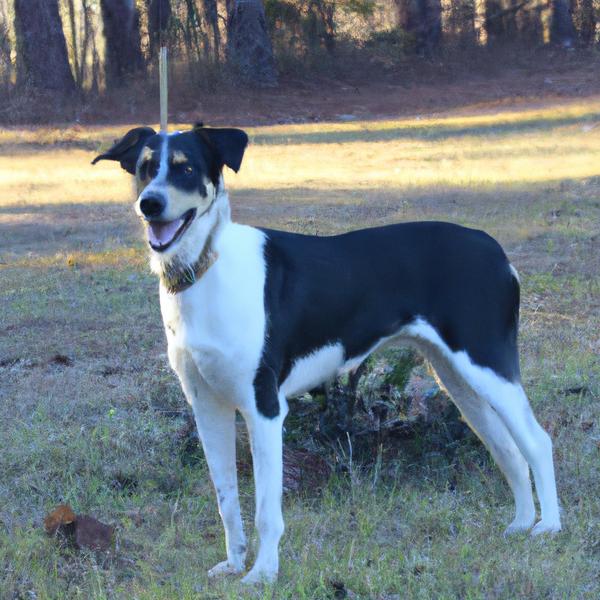
Mauxie
Bull Terrier vs Mauxie
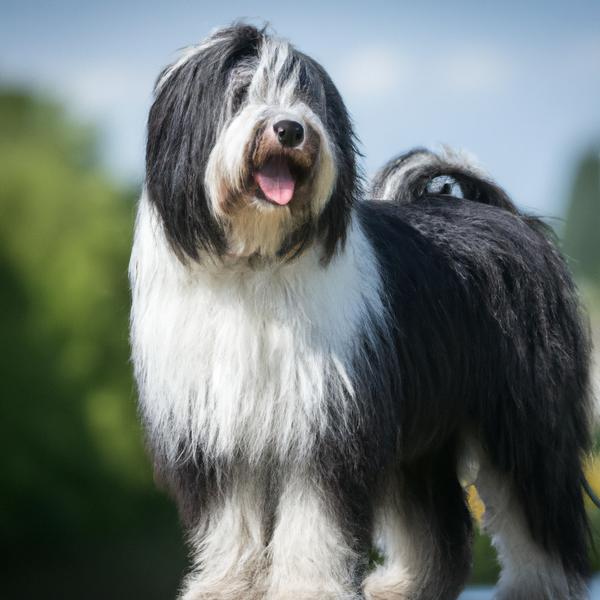
Polish Lowland Sheepdog
Bull Terrier vs Polish Lowland Sheepdog
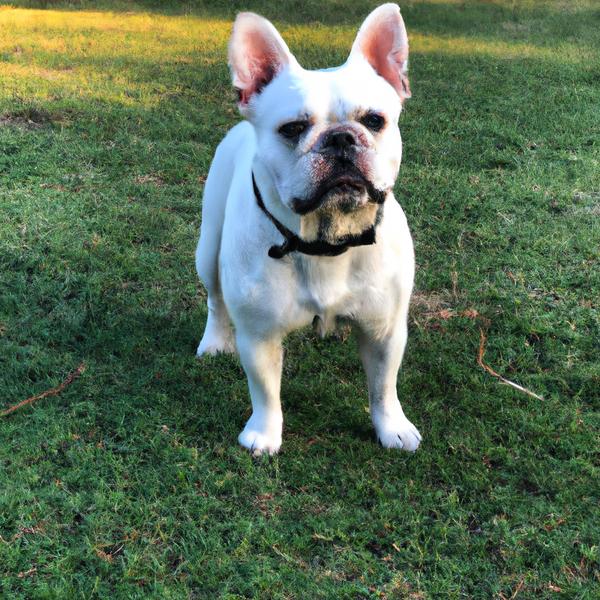
Frenchie Labrador
Bull Terrier vs Frenchie Labrador
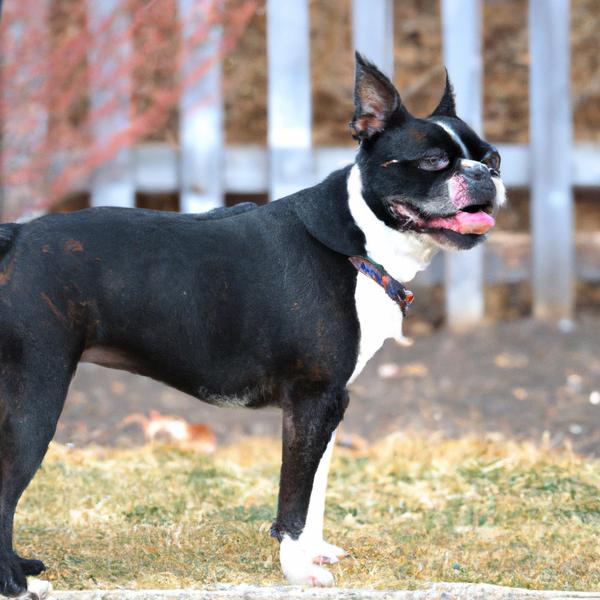
Bostie
Bull Terrier vs Bostie
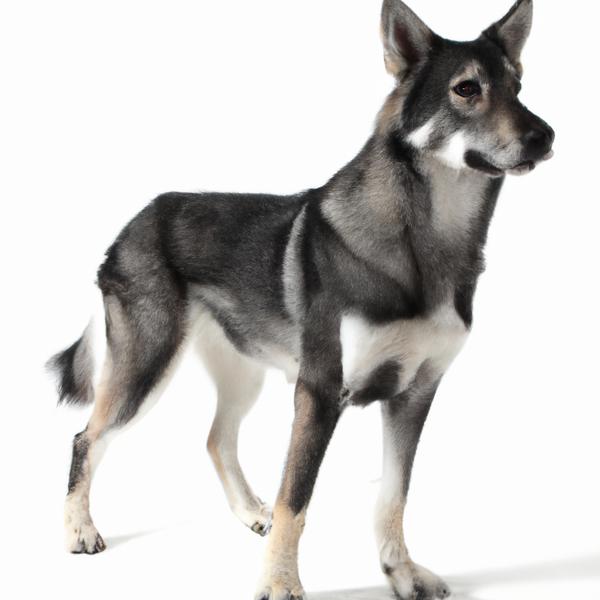
Nortese
Bull Terrier vs Nortese
